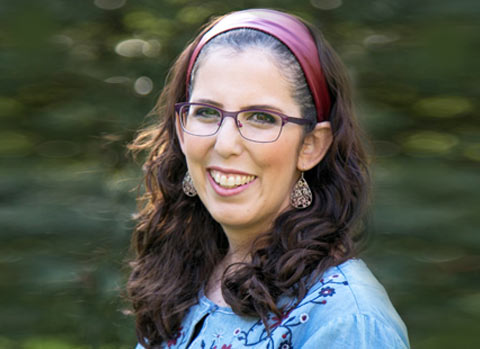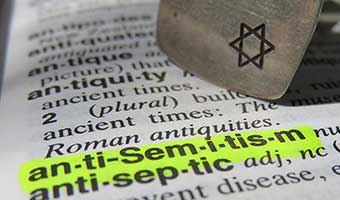
Libbie Goldstein has been a maternity nurse at Hadassah Hospital Ein Kerem since 2006, following in the footsteps of her mother, who was a midwife at Hadassah for 40 years. One of her most poignant memories is meeting a new mother whose experience mirrored her own.
Here is Libbie’s story in her own words:
Two years ago, starting a morning shift on the maternity ward, I was told that, during that night, a mother and her baby were admitted. I was informed that this young patient had, one week before, received a diagnosis of Hodgkin’s lymphoma.
The bells rang in my brain. This was the same diagnosis I had received while pregnant with my second daughter. “Hello, G-d? Can you hear me? I made a deal with you that I would be the last one to go through this! What happened to our deal?”
At the entrance to our unit, there is a heavy fire-resistant door. I always imagine that my fellow staff members leave lots of hypothetical things behind that door. Was it an argument they had in the morning or the unpleasant comment someone made in the carpark?
We learn to breathe in deeply and leave everything else behind before beginning our shift. When a medical professional enters the unit, it is on him or her to set aside personal beliefs and values, to don scrubs that represent a range of professional rules and values.
Our scrubs symbolize so much more than just a uniform. Obviously, it all depends how each one of us chooses to wear them. Personally, when I put on my scrubs, I’m still the same Libbie. I don't separate my personal life from my professional life completely.
And for this, there is a good reason. In the back pocket of my scrubs I carry my life's experiences. They are, piece by piece, a part of who I am today. And in no way can I, or will I, part from all of that.
Back to that morning shift.... In the corridor, I meet the new grandmother, the mother of the patient I was told about earlier that morning.
The staff on the night shift had already informed the grandmother that there was a nurse who had the same diagnosis during her own pregnancy and, now, thankfully, was a cancer survivor.
“Please speak to my daughter,” she says as she approaches me.
And then comes my recurrent deliberation: Should I share my personal medical history with the patient? If so, how much should I share? Is it at all professional? Will it be too much for her? Or G-d forbid, could I do damage?
I open the door to the patient’s room and introduce myself. I ask her permission to sit down, and I inquire how she is doing.
She cries and I listen. I sit by her side in silence. I take a deep look into her eyes. I check with her to see if it’s appropriate to hold her hand.
The new mother asks a lot of questions. They are the same questions that I, myself, asked a few years ago. Is now the right time to share my story? I decide that it is.
“I’ve been down that road myself and now, thankfully, I’m a cancer survivor,” I say with caution.
“What? Really?” she asks, and then continues with more comments and questions.
“How old is your child today?”
“Wow! You too have a girl!” And then she asks the most common question I get: “Is she healthy? Your baby girl?”
“Yes. Yes. Thank G-d. A healthy, beautiful, funny and clever child.”
I feel like I’m able to give her some comfort with this piece of personal information.
“Did the doctors let you breastfeed her?” she asks. “Because I really want to breastfeed. Even just once. But my doctors weren't sure if they can let me,” she shares in a voice filled with pain.
I can feel her pain and identify with her request. Please, let me give my child the best that I can. Even if it’s just once.... Such a painful memory.
But wait. Her situation is different from mine. I had to receive chemotherapy during my pregnancy in order to save my life and that of my baby. This patient has yet to receive any chemical treatments. And she so much wants to nurse her baby. So what exactly is the problem?
“Wait here,” I tell her. “I'll clarify some things and get back to you.” Her hematologist, coincidently the same one as mine, is on his morning rounds and still unavailable. I make a phone call to the nurse in hematology to find out this patient’s treatment plan. “You have to understand,” the nurse says to me. “Emotionally, it will be very hard for her to stop nursing in a week’s time when she begins treatment, so we thought that maybe it would be best if she does not start nursing at all.”
I need a minute to breathe. A rush of heat passes through my body. It brings up painful personal memories. “Listen,” I say assertively to the nurse. “I went through this myself. And I would have done ANYTHING to have nursed my baby, even just once!”
Then I put my personal history aside, and I say to the nurse, “We have a new mother explicitly telling us she wishes to breastfeed. She fully understands that it may be, at best, temporary. So please tell me who are we to deny her this request?”
I finish my conversation with the nurse, pondering who has given us the right to judge or make life decisions for those who come to us for treatment and trust us. I dial through again to my hematologist. “Libbie, is everything OK?” he asks with concern.
I tell him it’s important, but he needn’t worry about me, because this time I am calling as a colleague. I feel his relief, and we both pause to appreciate the moment.
And then immediately we return to our roles — doctor and nurse.
“It’s not a problem,” he says. “The patient may nurse until next week. When she starts chemotherapy, she will have to stop nursing. But please consult with the gynecologist too.”
I make a quick call to the gynecologist on duty, who gives the same answer, adding, “Just check with a lactation consultant.”
A minute later, I have the most experienced lactation consultant on the line. She, too, agrees that there is no problem for the mother to nurse.
I make one final call to the hematology nurse to update her as to what was agreed upon. I explain that it will be crucial next week to talk the patient through what lies ahead, as she begins her chemotherapy.
This conversational ping pong is totally part of my job as a nurse. We nurses don’t just carry out doctor’s instructions and give out medicines. Above all, we have to make sure we do no harm. And, sometimes, when harm has been done, we nurses need to fix it.
I accompany the ‘new mum’ to the nursery. There, her baby is connected to a monitor. I sit her in an armchair and place the baby on her. Within a few minutes, the baby latches on so naturally. I watch over them both with a smile and a tear.
In the midst of a painful emotional storm, a new mother receives a peaceful moment of pure happiness. Even if it’s temporary.
I’m full of gratitude for this moment, because I have fought on behalf of my patient for something that was truly important to her.
Maybe I did because of my own experience. Maybe because I feel so deeply that this is my calling. I pray that I will say the right words and do the right thing, that I will avoid adding unnecessary pain to what my patient is already carrying in her heart.
In that moment, I succeed in helping a new mother connect with her baby. Suddenly, I feel my own wounded heart healing little by little.
Libbie Goldstein, born in London, is a mother of four. Born in Hadassah, she also received three years of cancer treatments there. She is currently on maternity leave, enjoying the family’s new twins.








